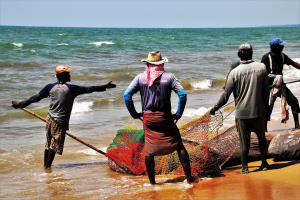
 By Venkatesh Raghavan
By Venkatesh Raghavan

The resignation from power by the Sri Lankan Prime Minister Mahinda Rajapaksa today, following clashes between anti-government protestors and his supporters spilling out on the streets is a cause of grave concern to India owing to the uncertainty it precipitates on the geopolitical front beside the prevailing economic crisis.
Sri Lanka, in fact, is in the throes of civil unrest and a rampaging mob set the houses of several cabinet ministers including the ancestral house of the Mahinda Rajapaksa in Kurunegala on fire within hours of his resignation to President Gotabaya Rajapaksa.
As of today, the southern tip of India is faced with an acute refugee crisis owing to jobless people and those suffering from hunger seeking shelter and safety from the throes of the economic crisis Sri Lanka is currently facing. Even as the crisis escalates, with an increasing number of arrivals from the northern tip, namely the Jaffna peninsula, there is a loud cry for humanitarian assistance from India for both essential commodities that include food, grains, sugar and edible items, medicines besides fuel.
The crisis that emanates from the shortage of food, fuel and adequate power supply has virtually crippled the country to the extent that India’s transhipments to the Colombo port are getting stacked with no means of transferring containers from terminal to terminal in the absence of financial support the authorities are faced with. This could also turn into a major bottleneck for India as a huge chunk of its cargo to other global destinations gets handled at the Colombo ports. In addition, it also directly restricts the shipment of cargo from India that is intended for Sri Lanka’s local consumption.
From the short-term point of view, India’s economic assistance to Sri Lanka on this front could be crucial. Though the Indian side has begun the construction of a transhipment hub in Kerala, the gestation period before it gets fully operational needs urgent remedial action. It’s acute in the sense that more than 70% of the transhipment cargo handled in Colombo port is of Indian origin.
There is also an adverse impact that Indian companies like Ashok Leyland, Dabur, and Airtel, besides PSUs that include State Bank of India, Indian Oil and corporate giants Tata Communications, Asian Paints etc. will have to bear the brunt in the face of continued and prolonged political instability in Sri Lanka. Even as the corporate front in the country has sufficient cause for anxiety, a silver streak does emerge when it comes to the enhancement of India’s export earnings. The power crisis has adversely impacted the manufacture of textiles as well as the tea plantation outputs. This is being seen as a major opportunity for Indian exporters to capture newer markets including countries of Latin America and countries from the West. This does enhance the scope for India’s garment industry and tea-producing states in both the North East and other regions to expand their global market base.
The current economic crisis the island nation is faced with has a host of contributing factors, beginning with the Easter Sunday bombing of 2019 that resulted in a 70% dip in tourist inflow. It virtually crippled the Sri Lankan economy which is heavily dependent on tourism. Next, the Covid19 pandemic made things worse with restrictions in place globally. The final nail was when the government in an ambitious bid to promote organic farming decided to impose a ban on fertilizers. This adversely impacted the farm output and by the time the state decided to revoke the ban, too much damage had already been done.
The country’s foreign exchange reserves have been rapidly dwindling and this has led to a lack of ability on Sri Lanka’s part to pay for the imports the country is badly in need of. With India being the third-largest contributor of Foreign Direct Investments (FDI) after China and the United Kingdom (UK), domestic geopolitical experts feel optimistic. They were of the opinion that India should be able to seize this opportunity to draw Sri Lanka closer to it and ward off the island nation’s affinity toward China.





